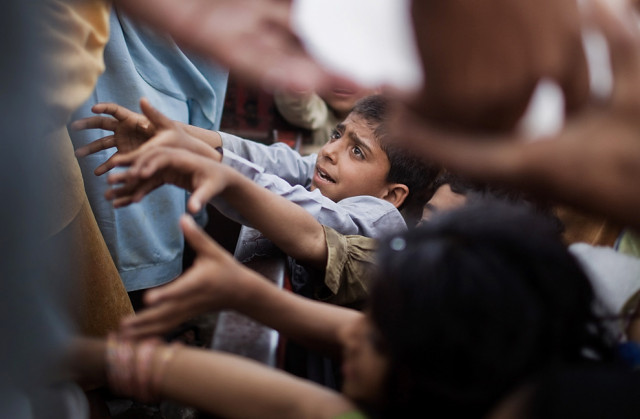Poverty – a contradiction of record and reality
Report says ranks of poor have increased in five years.

SDPI's report establishes that poverty has increased from 27% (45.9 million people) to 33% (50 million) in the past five years.
A share of GDP, that is 1.86%, has been allocated for this humanly service, but unfortunately this flow of money is without any strategic framework. Supporting different programmes, loyal members of these programmes always come up with overwhelming figures of poverty reduction. But a sensible and critical review of them give quite an opposing picture, whose canvas neither fits in the promises made by initiators of such programmes nor the situation in which the impoverished part of our nation lives.
Just giving a review of what we have earned through these government initiatives, it is worth mentioning that 4.966 million people have benefited. And just giving a thought back to previous years, 2.919 million people had benefited in 2008 and 2009 from all such programmes in toto.
What comes to one’s mind is that have the initiatives produced any difference? or does the state of poverty remain at the same level where it was?
Looking at recent reports produced by think tanks like the Sustainable Development Policy Institute (SDPI), the argument is that the measures taken by the government, though good in quantity, are not good in quality.
A proof can be the SDPI’s calculation of district-level poverty. Its report establishes that poverty has increased from 27% (45.9 million people) to 33% (50 million) in the past five years. Why poverty has increased, if until now, around 4.9 million have benefited from the government’s social welfare programmes, who are on record.
The reason is lack of accountability and corruption in welfare programmes. In the case of Benazir Income Support Programme (BISP), there is no proper accountability mechanism to monitor and check whether funds are properly distributed among the needy. Actual recipients of grants may not be all those who are actually on record. Poverty rather than being reduced is still on the increase.
If the ratio has increased instead of decreasing, then how can one say that these programmes are still delivering results? In one of the talk shows on a TV channel, BISP Chairperson Farzana Raja said if this programme continued at the present pace for five more years, poverty would come down to 20% in the country.
On the contrary, poverty has already increased six percentage points in the past five years, and if BISP has been running efficiently, then poverty should have at least remained static.
Apart from this, there is no guarantee that these social security programmes will remain in place after the upcoming elections.
According to recommendations given at a seminar on social security organised by SDPI, some strict and serious steps should be taken in a bid to tackle poverty. These include mapping of fiscal resources that need to be generated, efficient institutional arrangements to ensure effective delivery, establishment of reliable monitoring mechanisms to combat fraud and long-term policy development goals.
Considering and executing such measures efficiently might prove to be an essential step in efforts to reduce poverty substantially in the next five years.
the writer works in the Climate Change Unit, Islamabad
Published in The Express Tribune, February 25th, 2013.
Like Business on Facebook to stay informed and join in the conversation.



















COMMENTS
Comments are moderated and generally will be posted if they are on-topic and not abusive.
For more information, please see our Comments FAQ